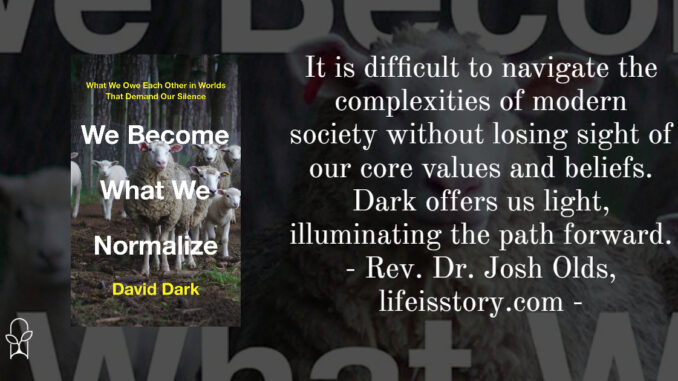
Published by Broadleaf Books on November 14, 2023
Genres: Non-Fiction, Christian Life
Buy on Amazon
Goodreads

How do we resist the false idols of power and influence to seek true connection and community?
From one of the most respected thinkers and public intellectuals of our day comes a book that is both a cultural critique of the state of our country and a robust summons to resist complicity. As we move through the world, we constantly weigh our conscience against what David Dark calls "deferential fear"--going along just to get along, especially in relation to our cultural, political, and religious conversations. Dark reveals our compromised reality: the host of hidden structures and tacit social arrangements that draw us away from ourselves and threaten to turn us slowly into what we decry in others.
We Become What We Normalize counsels a creative, slow, and artful response to the economy of reaction, hurry, shaming, and fearmongering. Dark offers a deep analysis of the ways our conceptions of ourselves and our use of technology often lead us away from what we believe, reinforcing the false narrative that we must humiliate others in order to survive. "I suspect we become what we sit still for, what we play along with, and what we abide in our attempts to access more perceived power and more alleged influence," Dark writes. We Become What We Normalize calls for a new kind of struggle, ethic, witness, and spirit that helps us step away from the infinite loop of normalizing harm into effecting true change for ourselves and the worlds we inhabit.
We Become What We Normalize. That sentence—the title of David Dark’s latest think piece—is poignant and demands self-reflection. Not “we become what we do” or “we come what we think” but “we become what we allow to be seen as normal.” And when we look at the normalcy of economic disparity, ecological catastrophe, racial inequity, and so many other things, we find that what we’ve normalized is leading to our destruction rather than our flourishing. We Become What We Normalize is a stream-of-consciousness social critique that calls readers to resist conformation and instead call out and speak against the things that ought not be.
Dark challenges the reader to resist the false idols of power and influence, advocating for a return to true connection and community. He offers a creative and artful response to what he sees as the prevailing culture of reaction, hurry, shaming, and fearmongering. We Become What We Normalize showcases Dark’s depth and breadth of cultural knowledge as he emphasizes the need for a new kind of struggle, ethic, witness, and spirit, encouraging individuals to step away from the cycle of normalizing harm and effecting real change in their lives and the broader world.
That said, this is a book that lives for the vibes. Dark purposefully creates a compelling pathos to the book, but the structure and cohesiveness of the content is a bit lacking. Dark assumes his audience knows all the cultural touchstones that he references, weaving in and out of anecdotes and references, often choosing obscure and complex stories when I could easily think of more well-known and applicable examples. The result is a book that feels a little discombobulating. Dark jumps around from here to there, never landing on anything long enough to really gaze on it with any substance. He touches on some very relevant themes, but how it all ties together felt a bit lacking in some areas.
Despite that, We Become What We Normalize’s thesis is sound. Dark’s message is a summons for individuals to critically evaluate what they accept and participate in, suggesting that our actions and the things we normalize can profoundly shape our character and society. Dark also offers hope to those who feel that do not have the power to change the prevailing zeitgeist by saying it is enough to simply stand against it. We may not have the power to change it, but we can refuse to normalize it. It is difficult to navigate the complexities of modern society without losing sight of our core values and beliefs. Dark offers us light, illuminating the path forward.
